This article was medically reviewed by Daniel Wozniczka, MD, MPH. Dr. Wozniczka is an Internal Medicine Physician, who is focused on the intersection of medicine, economics, and policy. He has global healthcare experience in Sub Saharan Africa, Eastern Europe, and Southeast Asia. He serves currently as a Lieutenant Commander in the U.S. Public Health Service and a Medical Officer for the Epidemic Intelligence Service in the CDC. He completed his MD at Jagiellonian University in 2014, and also holds an MBA and Masters in Public Health from the University of Illinois at Chicago.
This article has been viewed 3,688,986 times.
Never induce vomiting unless directed to do so by a medical professional, such as someone on a poison help line. If the poisoned person is not breathing, drowsy, agitated or having convulsions, call 911 or your local emergency services immediately.[1] Otherwise, call the U.S. Poison Help Hotline at 1-800-222-1222 and follow their exact instructions. Note that you should never induce vomiting for non-medically urgent reasons, such as weight control.
Steps
Seeking Medical Attention for Poisoning
-
1Contact Poison Control immediately. There is no reason to induce vomiting at home. If you or someone you’re with may have been poisoned, call the Poison Help Hotline at 1-800-222-1222 from anywhere in the United States. This number will connect you with a poison control center staffed by professionals that will provide you with free and confidential advice.[2]
- Call this number at any time for any questions about poisoning or poison prevention.
- Outside of the U.S., look up the number for poison control in your country and call them immediately. For instance, the number to call in Australia is 13 11 26.
- People can be poisoned by chemicals, taking too much medication, and even too much of a certain food. If you think you or someone else may have been poisoned, do not hesitate to call Poison Control.
-
2Follow Poison Control’s instructions exactly. Poison control personnel will ask you questions about what has been consumed, as well as any symptoms that have developed. If they direct you to go to an emergency room, do so immediately.[3]
- Again, do not induce vomiting unless directed to do so.
Advertisement -
3Bring the container of the potential poison with you. If you have a good idea what may have caused the poisoning, such as a bottle of pills, bring this with you. It will provide medical personnel with valuable information that can help them treat the poisoning victim.[4]
Avoiding Potentially Dangerous Methods
-
1Avoid emetics unless directed to take them. Over the counter emetics, or medicines that can make you throw up, should be avoided unless a medical professional directs you to take some as a last resort. Ipecac syrup, for instance, was once commonly used to induce vomiting. However, it has been shown that medications such as these can complicate treatment for poisoning. In fact, ipecac is no longer produced for over-the-counter sales.[5]
-
2Do not drink salt water. While salt water is a classic home remedy to induce vomiting, it may actually pose a risk to a poisoning victim.[6] This is because drinking salt water can push toxic substances further into the digestive track and speed up absorption of the substance in the process.
- Furthermore, drinking large amounts of salt water may cause serious health complications, including death.
-
3Take caution with other home remedies. Folk methods of inducing vomiting include drinking mustard or raw eggs, or eating large amount of food. The safety and effectiveness of these methods has not been proven. For instance, eating a large amount of food to induce vomiting may actually speed up absorption of a poisonous substance.[7]
-
4Avoid potentially dangerous substances. There are a handful of substances that can induce vomiting but are not recommended. These include activated charcoal, atropine, biperiden, diphenhydramine, doxylamine, scopolamine, copper sulfate, bloodroot, lobelia tincture , and hydrogen peroxide.[8]
Following Up
-
1Rinse your mouth after vomiting. There will likely be a bad taste in your mouth after vomiting that you want to remove. To do so, rinse your mouth with as much warm water as is necessary.[9]
-
2Do not brush your teeth. Brushing your teeth immediately after vomiting can cause damage to your tooth enamel. This is because corrosive gastric acid may have been brought into your mouth when you vomited.[10]
-
3Continue following poison control’s directions. Do whatever poison control tells you to do. They will likely direct you to drink water, but may direct you to hold off on eating or drinking for a while. If they tell you to go to the hospital, do so, even if you think you threw up most of whatever was bothering your stomach.[11]
Expert Q&A
-
QuestionWhat happens if it doesn't work for someone?
 Jonas DeMuro, MDDr. DeMuro is a board certified Pediatric Critical Care Surgeon in New York. He received his MD from Stony Brook University School of Medicine in 1996. He completed his fellowship in Surgical Critical Care at North Shore-Long Island Jewish Health System and was a previous American College of Surgeons (ACS) Fellow.
Jonas DeMuro, MDDr. DeMuro is a board certified Pediatric Critical Care Surgeon in New York. He received his MD from Stony Brook University School of Medicine in 1996. He completed his fellowship in Surgical Critical Care at North Shore-Long Island Jewish Health System and was a previous American College of Surgeons (ACS) Fellow.
Board Certified Critical Care Surgeon Depending on the gag reflex of an individual, there is a variable response to vomiting. Some folks are just less likely to vomit with the same stimulus, and this cannot be changed. If you're inducing vomiting because of a medical emergency, take the person to the hospital.
Depending on the gag reflex of an individual, there is a variable response to vomiting. Some folks are just less likely to vomit with the same stimulus, and this cannot be changed. If you're inducing vomiting because of a medical emergency, take the person to the hospital. -
QuestionIs it okay for me to make myself vomit when I'm depressed or under a lot of stress?
 Jonas DeMuro, MDDr. DeMuro is a board certified Pediatric Critical Care Surgeon in New York. He received his MD from Stony Brook University School of Medicine in 1996. He completed his fellowship in Surgical Critical Care at North Shore-Long Island Jewish Health System and was a previous American College of Surgeons (ACS) Fellow.
Jonas DeMuro, MDDr. DeMuro is a board certified Pediatric Critical Care Surgeon in New York. He received his MD from Stony Brook University School of Medicine in 1996. He completed his fellowship in Surgical Critical Care at North Shore-Long Island Jewish Health System and was a previous American College of Surgeons (ACS) Fellow.
Board Certified Critical Care Surgeon No, this is not okay. Self-induced vomiting is generally a sign of bulimia, which would require psychiatric treatment.
No, this is not okay. Self-induced vomiting is generally a sign of bulimia, which would require psychiatric treatment.
Warnings
- If you induce vomiting regularly as a way to lower your weight, or if you binge on food and then vomit to get the food out of your system, then you may be suffering from an eating disorder known as bulimia nervosa. Long-term vomiting can cause dehydration, damage to your tooth enamel or permanent damage to your esophagus. If you think you have an eating disorder like bulimia, talk to a counselor or a doctor right away.⧼thumbs_response⧽
References
- ↑ https://medlineplus.gov/ency/article/007579.htm
- ↑ https://medlineplus.gov/ency/article/007579.htm
- ↑ https://medlineplus.gov/ency/article/007579.htm
- ↑ https://medlineplus.gov/ency/article/007579.htm
- ↑ http://www.ncbi.nlm.nih.gov/pubmed/9482425
- ↑ https://kypoisoncontrol.com/2019/10/03/top-five-poison-related-myths/
- ↑ https://kypoisoncontrol.com/2019/10/03/top-five-poison-related-myths/
- ↑ http://www.ehealthstar.com/how-to-induce-vomiting.php
- ↑ http://www.paincare.org/throw-up/
About This Article
Before you try to induce vomiting, make sure to call the Poison Control Hotline to speak with a medical professional who can safely walk you through the process. Depending on your symptoms, you may be directed to go the emergency room. In that case, bring the potential poison with you to help the medical personnel determine how to treat your condition. Additionally, make sure to avoid using salt water or other home remedies, which can push the toxins further into your digestive tract. For more advice from our Medical reviewer, including how to avoid potentially dangerous methods to induce vomiting, keep reading.
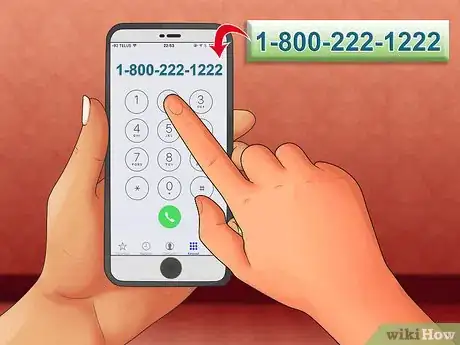
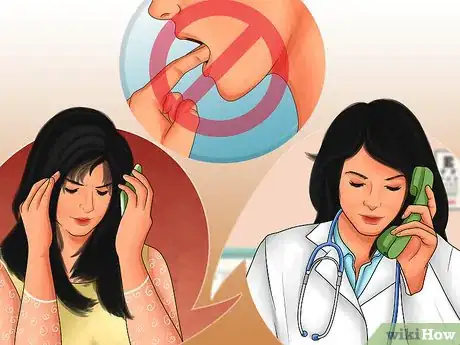
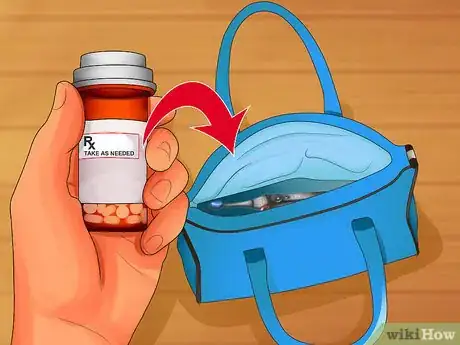
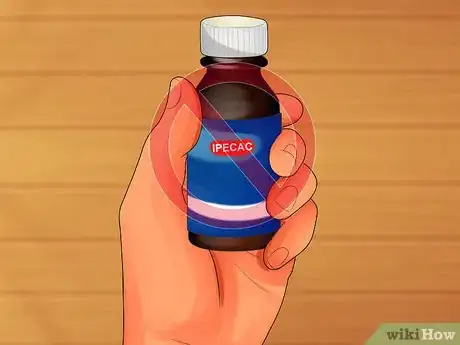
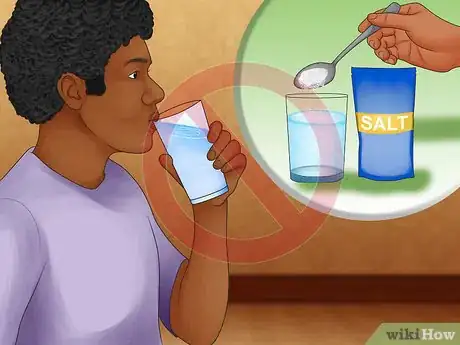
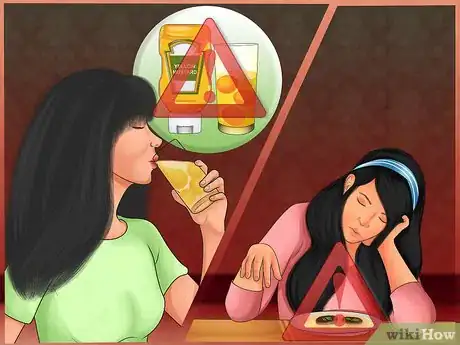
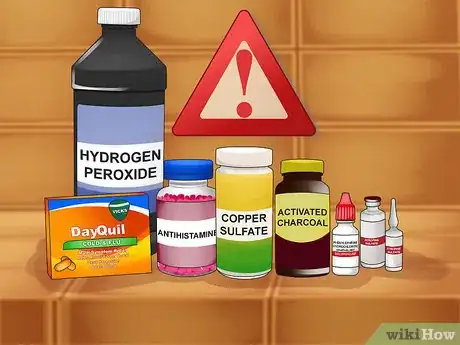
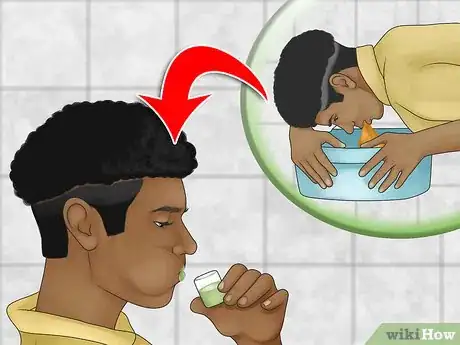
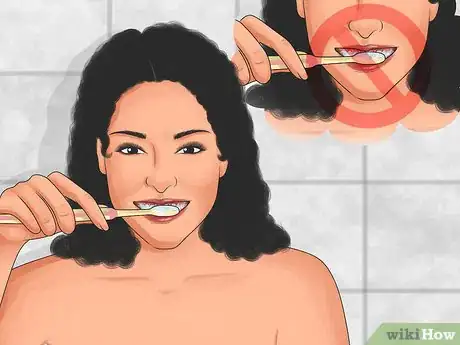
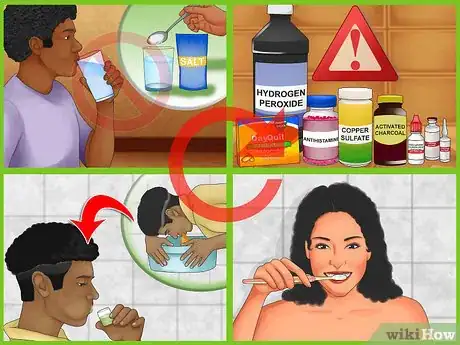


-Step-9-Version-5.webp)


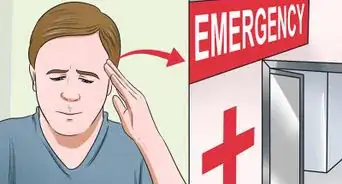

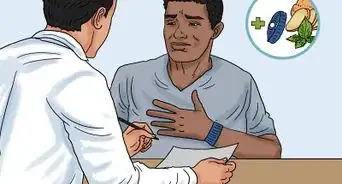



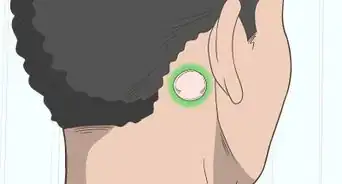
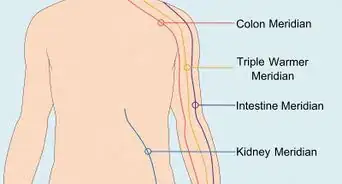











-Step-9-Version-5.webp)
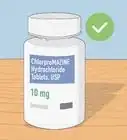



































Medical Disclaimer
The content of this article is not intended to be a substitute for professional medical advice, examination, diagnosis, or treatment. You should always contact your doctor or other qualified healthcare professional before starting, changing, or stopping any kind of health treatment.
Read More...